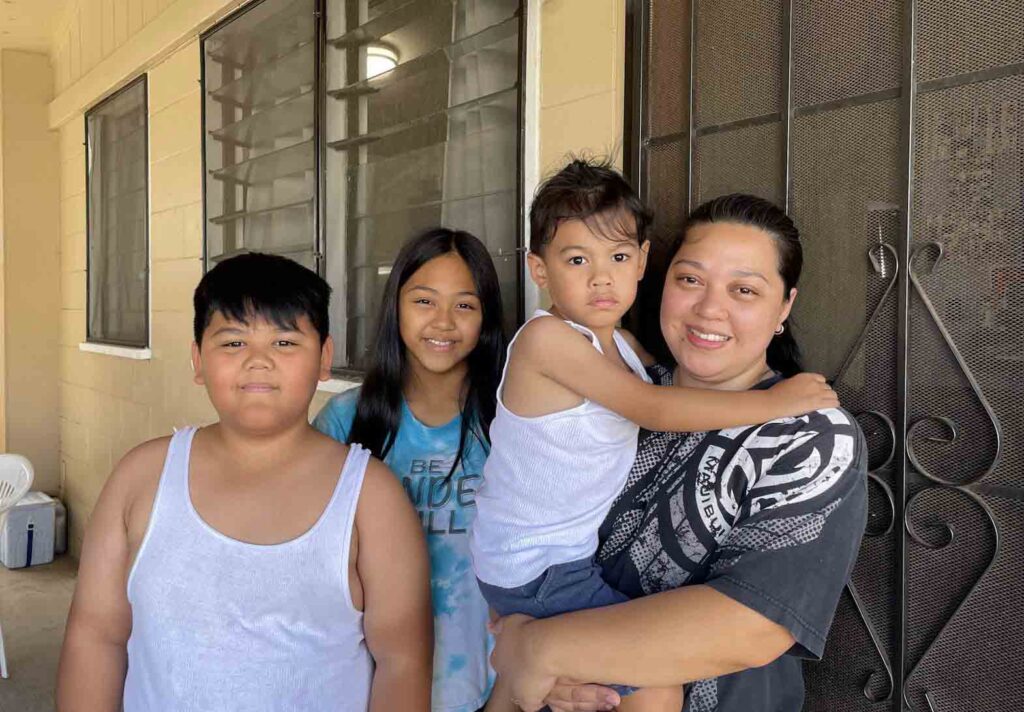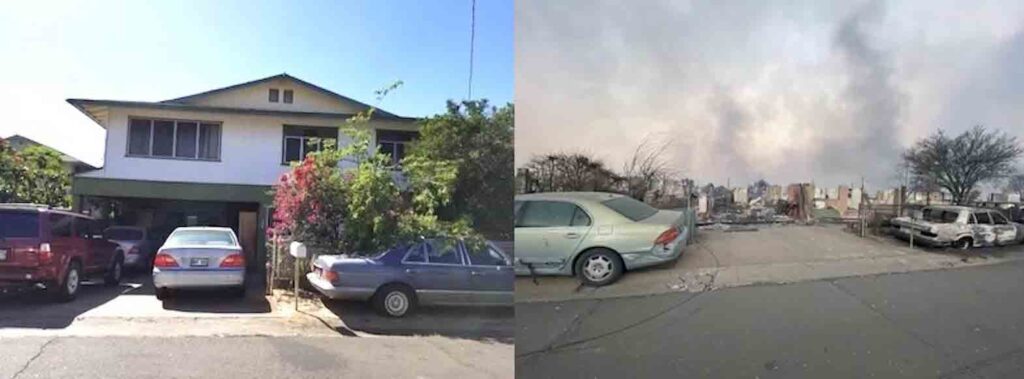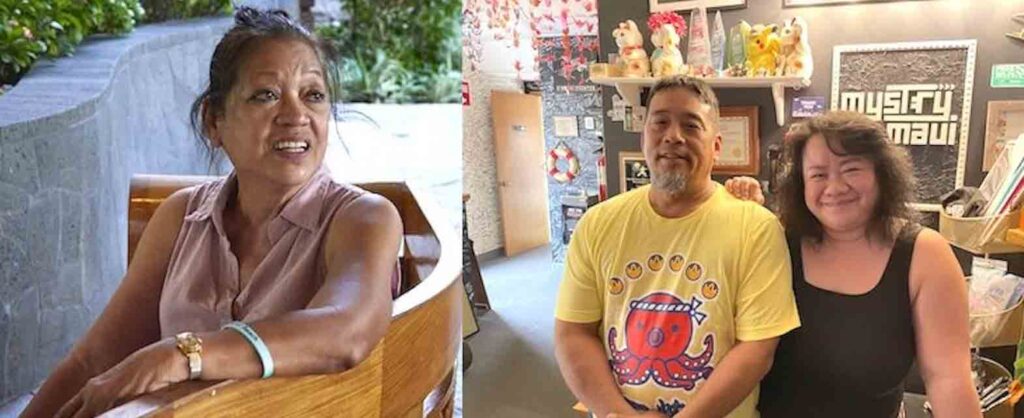Many of Lahaina’s Filipinos still missing as the search for bodies drags on

Hannah Camungao, her husband and three children took in 14 family members and four teachers after the fires in Lahaina. (Madeleine List/Civil Beat/2023)
As experts continue the painstaking work of identifying human remains from the fire that flattened much of Lahaina more than a week ago, the Filipino community is bracing for the worst.
Nearly 5,100 Filipinos lived in the former plantation town, about 40% of the population, according to estimates from the Hawaii Department of Business, Economic Development and Tourism.
Rick Nava, a Filipino community leader in Maui, lived near Lahainaluna Road and lost his home of nearly 50 years to the fires that spread rapidly on Aug. 8.
“I’m looking at the not-found list, and most of them are Filipinos,” he said, referring to a list that is circulating online of people who remain unaccounted for.

Rick Nava, a Filipino community leader in Maui, lived in Lahaina since the 1970s. This is his house before and after the wildfires. (Courtesy of Rick Nava)
Nava’s home after the fire. He said he could see the roof of his house on fire as he drove away the night of the blaze. (Courtesy of Rick Nava)
Nava narrowly escaped the blaze with his two grandsons, his wife, his son-in-law and his mother-in-law. They looked back to see the roof of their home on fire as they drove away.
Few of the 114 people confirmed dead have been identified as search teams with cadaver-detecting dogs comb through piles of rubble and burned-out buildings in a sealed off area that was hardest hit.
Many bodies were burned beyond recognition in the fire, which was so hot it melted vehicles. County officials have urged people with loved ones still missing to provide DNA to help with the identification effort.
Kit Zulueta Furukawa, director of the Maui Filipino Chamber of Commerce, said she didn’t want to speculate about numbers, but “we can assume that a large portion of it will be our friends and relatives in the Filipino community.
‘We’re All Family’
Right now, members of the tight-knit community are working to support each other while waiting for information, she said, speaking from her business, Mystery Maui Escape Room, in Wailuku.
“We’re bracing for that information when it comes,” she said, choking up as she recalled seeing dozens of pictures of missing people posted on social media by their loved ones.
It’s common practice for Filipinos in the U.S. to send packages, called balikbayan boxes, with supplies, gifts and other goods back to relatives in the Philippines. But now, Filipinos here are the ones in need of help.

Mila Lat, who lost the home where she lived with 13 family members in Lahaina, sits outside her temporary housing at the Hyatt Regency Maui (David Croxford/Civil Beat/2023). Right Photo: Kit Zulueta Furukawa, director of the Maui Filipino Chamber of Commerce, and her husband, Deron Furukawa, say the Filipino community in Maui is like a family. (Madeleine List/Civil Beat/2023)
The Philippine Consulate General in Honolulu said it sent an emergency consular team to Maui earlier this week. So far, no citizens of the Philippines have been confirmed as victims, it said, adding that local officials have not broken down the number of missing people by ethnicity of nationality.
Filipinos moved in large numbers to Maui in the early 1900s when the Hawaiian Sugar Planters Association began contracting laborers from the country to work on plantations.
Today, Filipinos make up the largest Asian ancestry group in Hawaii. They represent a huge segment of the workforce in the Lahaina area and include business owners, hospitality workers and teachers, Furukawa said.
Making Room For Displaced People
The Department of Education has also has recruited Filipino teachers to help fill vacancies in the state.
Seven of those teachers were assigned to Lahaina this summer and were displaced by the fires, Furukawa said.
The teachers, who are from Pampanga, northwest of Manila, arrived in Maui on July 16. Their first day of class was canceled because of the fires.

Mila Lat shows an aerial image of her burned home in Lahaina on cellphone. (Madeleine List/Civil Beat/2023)
Hours after the fires began to tear through the area, 14 family members and four of the recently arrived teachers from the Philippines showed up at Hannah Camungao’s house in Kahului.
She didn’t hesitate to welcome them all into her cramped, two-bedroom home, where she lives with her family of five.
“I keep telling them that we are just happy that they’re all alive,” she said. “We’re just happy that we’re all together and alive and healthy.”
Whether someone recently arrived from the Philippines or has lived in Hawaii for generations, Furukawa said there isn’t division in the Filipino community, particularly when it comes to supporting one another in a time of need.
“We’re all family,” she said. “Everyone’s your auntie. Everyone’s your uncle.”
Jaime Hidalgo, 52, a Lahaina resident who used to be a police officer in the Philippines, said he ran from the fire on foot down Honoapiilani Highway, stopping only to give his slippers to an older woman who had no shoes.
“Better me, I’m used to being barefoot in the Philippines,” he said, speaking from the parking lot of the Hyatt Residence Club Kaanapali Beach, where he has been staying since the fires destroyed his apartment. “It’s not nice, it’s being human.”
Read also: Musician among first identified fatalities in Maui wildfires
On Monday, Mila Lat, 70, was getting ready to leave her niece’s house in Kahului with many in her large extended family.
The group was able to get a few rooms at the Kuleana Resort in Lahaina as temporary shelter and was loading supplies into four cars to make the drive back.
Her house in Lahaina, where she lived since 1995, had been completely destroyed.
“This is my house from the aerial thing,” she said, pointing to an aerial image of her neighborhood on her cellphone. “We confirmed that it was burned. And that’s my truck that I left over there.”
She had housed generations of family members from the Philippines in the two-story home and at one point built an extension so she could fit more people. She had hoped to invite others to stay in the near future.
But despite the traumatic loss of her home, Lat and her family members seemed upbeat as they prepared to journey back toward the disaster zone to survey the damage.
They laughed and joked as they stocked their vehicles with water, canned goods and instant noodles.
Camungao said the loss of her aunt’s house, where she spent much of her childhood and celebrated happy moments like her high school graduation, is devastating, but her family always tries to stay positive.
“We look forward to being together. I hope we can rebuild the house and just make more good memories,” she said.
After a few nights at the Kuleana Resort, Lat, some of her family members and a few of the Filipino teachers she had been hosting moved to the Hyatt Residence Club Kaanapali Beach.
Sitting alone on a bench outside the hotel on Friday, she said people often ask her why she’s always smiling. But it’s not that she doesn’t feel sad sometimes. She knows her family and others in her community depend on her, so she tries not to let them see that side.
“I cannot feel down, I cannot feel sad,” she said. “I have got to be strong. I have a lot of people relying on me.”
Republished by permission from Civil Beat, Aug. 19, 2023. Civil Beat’s coverage of Maui County is supported in part by a grant from the Nuestro Futuro Foundation.

